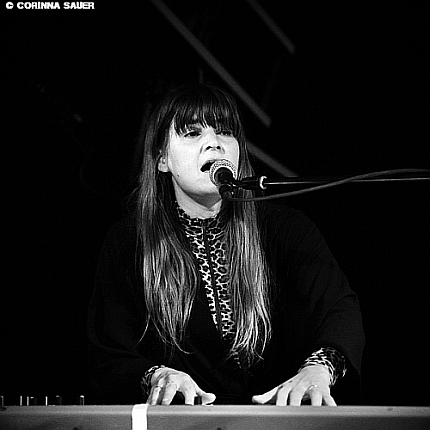It doesn’t matter what kind of voice you have: if you’re not like Diane Krall you get the Kate-Bush-Thing thrown into your face.
***
Konzert und Interview am 18. September 2015 in der Kantine/Berghain
Interview & Text: Friederike Suckert, Foto: Corinna Sauer
Die drei Jungs von Trickser luden zum Dreijährigen ein und wir drei von MMM kamen natürlich gern. Zwei von uns vor allem wegen der Schwedin Jennie Abrahamson, die es mit ihrem Album „Gemini Gemini“ in unsere Herzens-Top Ten 2014 geschafft hatte. Die Sängerin ist seit 2006 solo unterwegs, hat vorher aber immer wieder in einigen Bands gespielt. Die Industrie an sich stößt sie immer wieder ab, aber die Musik zieht sie doch wieder zurück, zuletzt 2013 von Peter Gabriel, der sie als Support für seine Europa Tour wollte. Darüber – und über die Rolle der Frauen im Business – haben wir vor ihrem Konzert gesprochen und selten hat mal eine so auf den Tisch gehauen. Ich bin jetzt ganz schrecklicher Fan, nicht zuletzt weil mich selten jemand so wie sie auf Augenhöhe behandelt hat.
Das Konzert war sehr ruhig, nur sie und Synthies und so ein bunt leuchtendes Xylophon. Sie spielte ein paar ihrer Lieblingssongs und erzählte uns immer eine kleinen Anekdote zur Entstehung. Hat mir sehr gefallen, aber wie gesagt: ich war da eh schon Fan. Da konnte ich das Weglassen meiner Lieblingssongs verkraften.
Am Rande: über Jennie haben wir schon mehrmals berichtet.
***
Interview mit Jennie Abrahamson
***
Hello! I’m Rike von musikmussmit.de, we’re a blog from Berlin and we talk about music.
JA: Yeah, I know. I looked at it, but couldn’t read it since I don’t speak German.
Yes, that’s right, but we have a few interviews in English. You said, when you wrote „Gemini Gemini“ that you were kind of tired of the music business, but you’re back on the road again, so…
JA: (lacht ein bißchen) Yeah, I’ve been tired of it. You get tired of it all the time, because it’s a pretty shitty business, but I think that I managed to maintain more – I don’t know – love for the music. That’s what it’s all about. I just had a little hassle with the publisher and a wise person asked me: „But Jennie, what are they after? What do you think?“ And I said „Money.“ And that’s not what music is about. So that was a good reminder. I forget that sometimes myself. You need to remember why you’re in it, and that’s not because you want to get rich or whatever.
You’re still able to do what you love for a living?
JA: I live a simple life, I don’t need that much. I mean, of course, I wouldn’t say no to having a big house by the lake, but that’s not my drive, to live the rich life. That’s pretty far away from where I am and I’m fine with it.
And you’re able to do a lot of stuff besides music. You studied psychology.
JA: Yes, I was doing that, but I don’t study anymore.
Did it change your view on the business a little bit?
JA: Yes, in a weird sense it kind of did, because I realized what draws me back to music all the time. And that’s not being in the business. It’s because I love to sing and to write music. I love composing and to play with my band and being in that creative world. Every time I try to step away from it, it always draws me back with a big hand. The most obvious one was when I played with Peter Gabriel. To get to play with your biggest icon… That was when I was thought that I should take a step away from music. I worked for the psychological program when I got the call, if I wanted to support the world tour. In a magic way it’s always drawing me back. And it’s because of the music, not of the business around it.
Could you imagine, that maybe one day, if being in the music business doesn’t work well or you really don’t want to be a part of it anymore, you would work as a music teacher again?
JA: I did that in the beginning of my career. Part time. But I’m not interested in teaching music, that’s why I started studying psychology, so that I would have a B-plan if I don’t wanted to stay in music. I love meeting students and talking to them about my knowledge. What I have done so far, my view on the music business or about song writing or music business knowledge. I know a lot. I can read contracts and I understand what’s in them. I know a lot of pieces since I had a record label for so long. So I love sharing knowledge in that way. When I worked as a teacher, it was great fun. I had brilliant students at one of the best music schools in Stockholm between the ages 16 and 19. I worked with the students who had their own material, a very clear expression musically, but over time, I came home from work, I didn’t have the desire at all to go to the studio, because I was too tired. So I felt that all the music came out, but it wasn’t like a sharing experience. I felt dry, even though I liked the students. I’m still in contact with a lot of them. And giving them grades! I hate that! It’s just opposing EVERYTHING. You follow someone, you’re kind of their psychologist for a year, helping a teenager coming out of a depression through singing, you’re the grown up person that they trust and then you’re just like (Lehrer-Stimme) „Well you haven’t really lifted up to an A, so I’m giving you a B.“ No, it’s just totally counterproductive and I really don’t like it.
I also think it’s hard to give grades in music.
JA: It’s super difficult.
How can you judge music you don’t like, even though it’s pretty good…
JA: Maybe someday… You know, I grow older and maybe I can convey my knowledge more into writing and composing. I love arranging strings and stuff like that. Maybe I can write more instrumental music, when I want to live a more „homey“ life. Now I’m doing more pop stuff, but there’s more to do.
Pop is nice.
JA: Pop is nice! I’m never gonna be like “Okay, I’m turning fifty, now I have to stop playing pop music!“ Even though some parts of the industry really think that women should.
That’s what my next question is about. I read that you are into Gender Studies, that you wrote a song about feminism and queer people. A year ago you said, that women in the music business have to fight more than men. Do you think that might have changed a little bit?
JA: I think, it’s about to change! When I worked as a teacher, I met a lot of great young women. I mean, girls nowadays grow up, at least in Sweden, with a sense of feminism. They know their rights from early on, they know about women subordinated to men – disempowered at least. There are a lot of men who feel powerless, but as a gender they are powerful. We’re born like that, there’s nothing more to say about it. But I think that girls now are much more aware of it, they question it much more and they start playing with it. In my generation, as a parent, it’s not a strange thing to send your girl to drumming lessons. It doesn’t have to be ballet for girls and drums for boys anymore. I definitely see a slow change and there are a lot of young women and artists in Sweden now, who are so brilliant: their message to the people they play for, how they perform music and what band they choose. It seems to be important to get women into a band. It might be a little thing, but… if you only see men on a stage, then girls maybe think, that’s how it should be. So of course, if girls see more women, or someone in between, on stage, it inspires them. Look at any sport. We have really good people in skiing in Sweden now and there are always more following up, because they’re inspired. It’s an effect: when you see someone else make it, you think „I can do that, too.“
You can see what women can do. For me it’s a big topic, that women are still underrated in the pop business.
JA: Yeah, but just look at Madonna’s latest tour: People were really like „She shouldn’t do this anymore! 57, she should know better!“ Nobody says that about Bruce Springsteen or Keith Richards. It’s just because she’s taking us to a certain space. Not that I love everything that Madonna does, but I love the way she created her career and took her space and that she’s just doing it. And what she’s taking shit for is just: „She should know better!“
It’s simply age-shaming for women. Mick Jagger is also kind of old (and a little bit creepy) and is doing it for decades.
JA: It’s more empowering for men. They’re like „I stayed in the business and people come to my shows!“ But I think more and more people are taking off those glasses and see that this is very weird and unfair. So I believe in a change, I do.
I think, it still happens a lot to women. Especially in the music business. But it’s 2015, why do we even have to talk about it?
JA: We should expect more. Some people are like “Oh, they need to talk about feminism all the time.“ That was last year’s big conversation. But until we see a big change, it’s still gonna be an important thing to talk about. If you look at it in Sweden, there are still only a few women that are in power in the music business. We have no female CEO’s, we have like two female A&Rs at the record labels or the publishing companies, so most of the women are just coordinating the men’s work. And they’re doing the heavy work. There are men who dream big and bla bla bla, and then there are women to take care of it and see it through. So we still have those classic female role like and it’s very tiring.
It’s still the same in Germany.
JA: I really don’t think that’s it. I mean, I am very good at coordinating, it’s one of my skills, but I’m so incredibly fed up and pissed off by this role, or how a woman should be. It’s a really narrow thing and I hate it.
Let’s hope it gets better. You know, I’m not a musician, I’m just writing for the blog.
JA: Yeah, but you see a lot.
I really don’t know a lot about being a woman in the music business. All my female friends who play an instrument said to me, when I thought about taking drumming lessons: „Have fun finding a band.“ Women who are 35 and in the indie music business tell me this. That’s depressing. I don’t want to be a pro, that’s the thing.
In another interview you said, that your voice is “too high” but you don’t want to work against that anymore.
JA: I guess, I kind of accept it. You always want the difference. When you have curly hair, you want straight hair. So I always wanted to be able to sing low and have a smooth kind of singing, but I realized that my strength is what I know. I have a high pitched voice and I realized that it’s impossible to change. In every production I kind of tried to lower the volume of the vocals and put them more into the music. When we were doing the mixing, I wanted to kind of hide the vocals in the music. It never worked, we tried it in every possible way. The only thing you hear is that the vocals are too low. That’s what everybody said: „No, turn the vocals up!“ So I realized that I have this kind of voice. It needs to be floating on top of anything else. That’s what it’s suitable for, so I use it that way.
***
Sie sehen gerade einen Platzhalterinhalt von Youtube. Um auf den eigentlichen Inhalt zuzugreifen, klicken Sie auf die Schaltfläche unten. Bitte beachten Sie, dass dabei Daten an Drittanbieter weitergegeben werden.
***
But no one ever said something like „Oh, your voice is so high, you’re such a pop girl!“?
JA: No, but what I get to hear in nearly 90 % of all reviews is -because the only other female artist that is known in history, that has a high pitched voice is Kate Bush- that I want to sound to like her. She has a totally other way of singing. Most of the people mean it as a compliment and I enjoy her singing, too. It’s not that I get angry all the time, but that’s also something about women in music. People have just one reference. My friend Ane Brun came out with a new album and it’s brilliant. And again! She’s taking a step into some kind of 90’s vibe with a lot of Trip Hop influences and the review she’s getting is like: „She’s taking a step further into the world of Kate Bush!“ No, she isn’t! There’s nothing…
She doesn’t even have a voice like Kate Bush!
JA: It doesn’t matter what kind of voice you have: if you’re not like Diane Krall you get the Kate-Bush-Thing thrown into your face. It means there’s something about the imagination of women in the music industry.
Yes, it’s that the people always need comparison.
JA: Which I understand, because it’s easier to hang in if you want to tell a story about someone. It’s easy for people to imagine what it is, when you say it’s a mix between this and that. I understand that, but as a woman you’re never compared to a man’s work in a review.
No, never!
JA: Even if I say „My music can be compared to this guy or this band“, you always get compared to women. And that makes women compete with each other. And you have to compete with the number 1: Kate Bush. It’s just bizarre. Sorry, I’m ranting today. I’m angry.
No, I’m totally fine with it, I like that. But do you think you will go to the studio again this year?
JA: Yes! I’m really looking forward to it. I’m always frightened in the beginning of a writing period. I’m always like „How do I write a song? I have no idea!“
It’s the classical empty page.
JA: Yes, it’s an empty page. But I started for real this week. It was one of my voice memory ideas and I very shortly played a bass, a midi bass, and put some PAD and some highhead in, and then I sang the refrain and then I started crying, because it was sooo much fun! It was like: „Aaaaaah! Why don’t I do this all the time?“ So now I broke the spell and I’m longing to do this. Writing and being in the studio.
I guess you’re working a lot. What do you do for relaxing?
JA: We have a tiny little house at a lake in Sweden and that’s my soft space. I just come there and sleep and walk in the forest and lay by the water on the docks and read books. I read a lot, when I need to take my mind off, and cook food. I take time to actually cook proper food. Food and literature are my two big passions.
Do you still hear music in that time?
JA: I like to have it quiet. I hear the number one talking channel on state radio the whole day to have some news, but I don’t really like to listen to music that much. I definitely have periods where I need to turn it off. You’re tired of sound.
________
Diskographie:
• Lights (2007)
• While The Sun’s Still Up And The Sky Is Bright (2009)
• The Sound of Your Beating Heart (2011)
• Gemini Gemini (2014)
Das Interview, das wir mit Kalle Mattson am gleichen Tag führten, könnt Ihr hier nachlesen.




